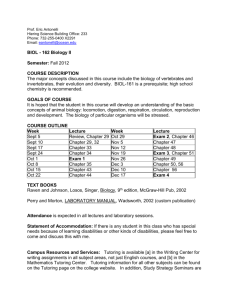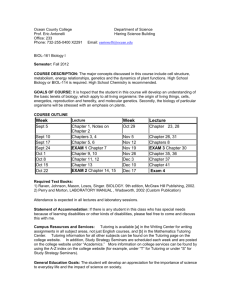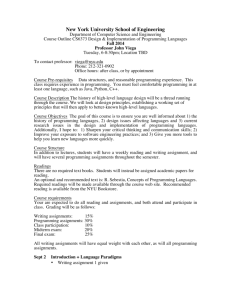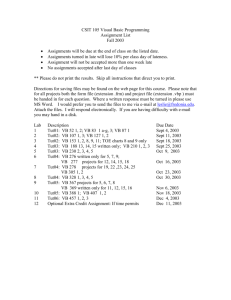Syllabus for Fall 2009 - Faculty Web Directory
advertisement
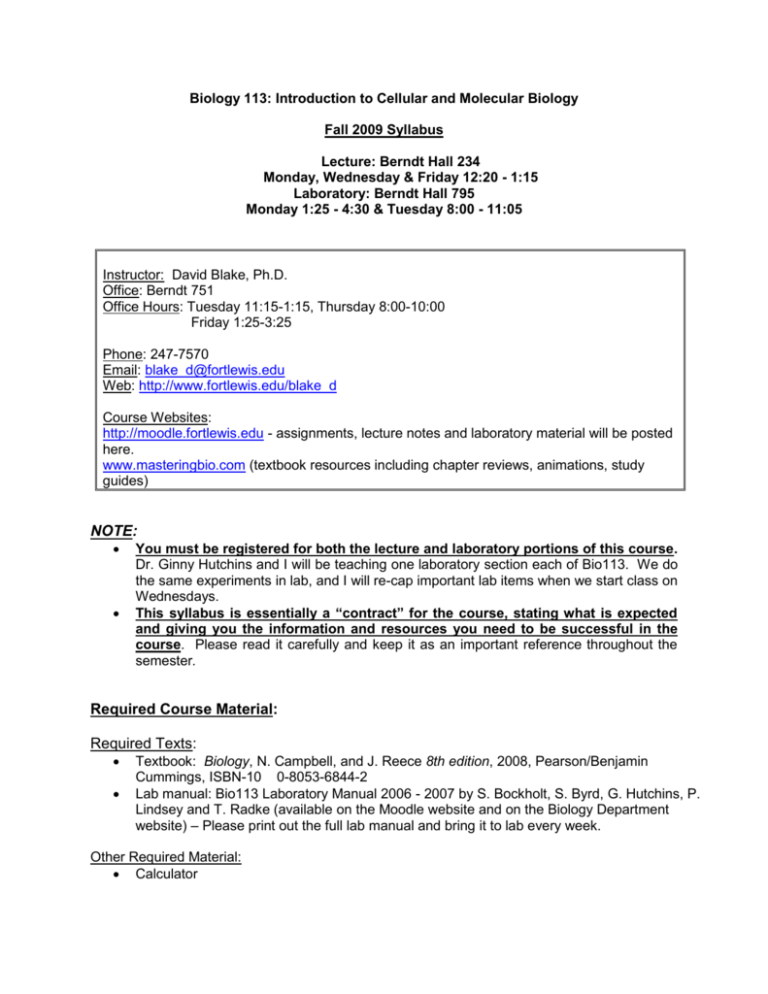
Biology 113: Introduction to Cellular and Molecular Biology Fall 2009 Syllabus Lecture: Berndt Hall 234 Monday, Wednesday & Friday 12:20 - 1:15 Laboratory: Berndt Hall 795 Monday 1:25 - 4:30 & Tuesday 8:00 - 11:05 Instructor: David Blake, Ph.D. Office: Berndt 751 Office Hours: Tuesday 11:15-1:15, Thursday 8:00-10:00 Friday 1:25-3:25 Phone: 247-7570 Email: blake_d@fortlewis.edu Web: http://www.fortlewis.edu/blake_d Course Websites: http://moodle.fortlewis.edu - assignments, lecture notes and laboratory material will be posted here. www.masteringbio.com (textbook resources including chapter reviews, animations, study guides) NOTE: You must be registered for both the lecture and laboratory portions of this course. Dr. Ginny Hutchins and I will be teaching one laboratory section each of Bio113. We do the same experiments in lab, and I will re-cap important lab items when we start class on Wednesdays. This syllabus is essentially a “contract” for the course, stating what is expected and giving you the information and resources you need to be successful in the course. Please read it carefully and keep it as an important reference throughout the semester. Required Course Material: Required Texts: Textbook: Biology, N. Campbell, and J. Reece 8th edition, 2008, Pearson/Benjamin Cummings, ISBN-10 0-8053-6844-2 Lab manual: Bio113 Laboratory Manual 2006 - 2007 by S. Bockholt, S. Byrd, G. Hutchins, P. Lindsey and T. Radke (available on the Moodle website and on the Biology Department website) – Please print out the full lab manual and bring it to lab every week. Other Required Material: Calculator Composition book - for taking notes and recording information in lab. These books are available at the bookstore. Course Description: What is this course about? Basic biochemistry - What types of molecules are needed to make a cell? What chemical structures make these molecules suited to the functions they perform within the cell? Energetics - How do cells acquire and use energy? What are the physical laws that govern this energy utilization? What strategies do cells use to conserve energy? Cell biology - What is the basic structure of the cell? How do the individual parts work to keep the cell functioning properly? What happens when a cell structure doesn't function properly? Gene expression - How do cells get the information they need to make new parts? How does the information in DNA get translated into products necessary for cell survival? Basic cellular regulatory mechanisms - How does a cell control what comes in and what goes out? How do cells respond to extracellular signals like hormones or food? What changes inside the cell when a signaling event occurs? Lab experiments related to topics covered in lecture - The laboratory will include experiments such as basic microscopy of cells, plant physiology, osmosis/diffusion, metabolism, and an introduction to molecular biology (DNA isolation, genetic engineering). This course is designed primarily for those who are pretty sure they want to be biology majors. Some of you may also be learning about basic cell function as a part of your major in biochemistry. Others may be taking this course as a part of requirements for further study in health related careers. If you are NOT one of these types of students, you might want to reconsider your enrollment. Come and talk to me if you have questions, and I'll help you decide if this is the appropriate course for you. Communication: I will use your fortlewis.edu email for regular communication about class assignments and updates, as well as the moodle course website. Be sure to check your Fort Lewis email account often to be sure you are receiving course-related messages (other email addresses such as yahoo, hotmail, aol, etc. will not be used and cannot be forwarded to from your fortlewis.edu account). Email is also the best way to communicate with me in addition to seeing me in person at my office. Course websites: www.moodle.fortlewis.edu – used for general course information and communication This website will contain much pertinent information for this class such as: course updates, assignments, lecture material and laboratory assignments. To use the website, you first need to register for this class, then use your name and password as you would use them to access FLC email. Once you have registered, you can access the specific website for this class by searching with my last name (Blake) as your instructor or under Biology courses. You should check the website regularly for course postings, updates, and assignments. www.mastering bio.com. The purchase of a text gives you access to this website. This website has state-of-the-art BioFlix 3-D animations and study tools, including an electronic version of the text (for those times when you just can’t lug it around). It also has practice tests and quizzes with answers and explanations. There are also flashcard study tools to help you learn the important vocabulary in each chapter. Your text contains information on how you access this site and has the password you will need to enter it. If you bought a used textbook or a textbook on-line without an access code, you can purchase a new access code through the site for $40. We will be using this website for several on-line activities and quizzes, therefore you need an access code to use this website. www.campbellbiology.com – contains textbook resources This website is a great learning resource that serves to supplement your reading of the text and lecture sessions including chapter reviews, a glossary of terms, and interactive activities. Computers are available for you to use throughout the campus. There are computer labs located in Hesperus, Sage, Noble, and Berndt Halls, as well as the library. If you need some help in using the internet or features of the course website, you should be able to get help from lab assistants in these computer labs. If that doesn’t work, feel free to come ask me for some help. Grading/Evaluation: Your final grade will be determined by your performance during the lecture portion of the course as well as in the laboratory component from a total of 750 points. Lecture exams/assignments/activities will count as 70% and lab assignments/activities will count as the remaining 30% of your final grade in this course: Evaluation method 2 lecture exams plus a cumulative final1 Weekly assignments/quizzes2 Laboratory assignments/activities3 % of final course grade 40% 27% 33% Total points 300 200 250 1. Lecture exams: There will be a total of 4 lecture exams during the semester and a final exam. You must take all the exams including the final, which will be cumulative. 2. Assignments/quizzes: these will primarily consist of short written assignments, however in-class or online quizzes may also be used. 3. Laboratory: see separate laboratory syllabus for details on schedule and grading. Final Course Grade % Total Points Letter Grade 90-100% A 80-89% B 70-79% 60-69% < 60% C D F I will assign + and – grades and may choose to curve the final overall grades, based on the class distribution of grades. Roughly, +/- grades will be assigned within 2 points of the letter grade margin (i.e. B+ ~ 87-89%). Improvement during the semester and demonstration of engagement with the material, through activities such as class participation, will be beneficial to your final grade. OTHER POLICIES RELATED TO GRADING: Late materials will be subject to a penalty of 10% per day late, with a 0 for a week or more late OR turning in after the instructor has already graded and returned assignment to the rest of the class. Extra credit will NOT be offered. Course Policies: Attendance: You are expected to attend every class and lab session. Quizzes and other assignments may be given in class. Being absent to these classes will not enable a student to fully participate in all the graded materials. Laboratory attendance is required. Two or more absences in laboratory attendance will result in a 0 for the laboratory component of this class. Classroom conduct: Please turn off all cell phones, pagers, etc. during class to avoid disruptions – if you must answer an urgent call during class, please let me know at the beginning of class AND sit near the door so you can quietly leave to talk outside the classroom. You are also expected to arrive in class on time and stay for the duration of the class period. Make-up Exams/Assignments: As a general rule, make-ups for any exams or assignments in the course are not allowed. Make-up exams will be given at my discretion and only with documented evidence of an illness or other personal event preventing you from taking the exam on the scheduled date. The final exam is not eligible to be made-up after the assigned date (see schedule below). Drops: The college deadline for dropping this class with a "W" is Tuesday, September 15. Without exceptional circumstances, I will not sign a "W" on a drop sheet after this date unless you are currently passing the course with a C or better. Academic Honesty: COPYING OR ANY FORM OF CHEATING WILL NOT BE TOLERATED. Any incident of academic cheating or copying/plagiarism will result in written referral to the VP for Academic Affairs (which could result in expulsion). The penalty for cheating will be a score of 0 points for that assignment or F in the course. Accommodations: If you need course adaptations or accommodations because of a disability, please see me to discuss those needs WELL IN ADVANCE of any exam dates or other relevant course activities. Students with disabilities have equal access and equal opportunity in this course. If you require reasonable accommodations to fully participate in course activities or meet course requirements, you must register with Disability Services, 280 Noble Hall, 247-7459. If you qualify for services, bring your letter of accommodation to me as soon as possible. Bio 113 Fall 2009: Tentative Lecture Schedule Reading: Biology 8th ed. Campbell & Reece Week Date Lecture Topics 1 Aug 31 - Sept 4 Chapter 1, Ch. 2 p. 30-37 Ch. 2 p. 38-43, Ch. 3 p. 46-56 Themes in studying cells / Biological Chemistry / Water / Chemical Bonds 2 Sept 7 - Sept 11 Ch. 4 p. 58-66 Ch. 5 p. 68-74 Carbon chemistry / Functional Groups Macromolecules / Polymers / Carbohydrates 3 Sept 14 - Sept 18 Ch. 5 p. 74-77 Ch. 5 p. 77-81 Lipids / Proteins / Nucleic Acids 4 Sept 21 - Sept 25 Ch. 5 p. 81-86 Ch. 5 p. 86-89 Review / Catch-up Mon. Sept 28rd Exam 1 Chapters 1 - 5 5 Sept 28 - Oct 2 Ch. 6 p. 94-111 Ch. 6 p. 112-122 Cell parts/ Separation of cell components Cells parts / Function 6 Oct 5 - Oct 9 Ch. 7 p. 125-135 Ch. 7 p. 135-139 Membrane Structure & Function/Passive Transport Active & Facilitated Transport 7 Oct 12- Oct 16 Ch. 8 p. 142-151 Ch. 8 p. 151-159 Bioenergetics / ATP Enzymes / Enzyme Regulation 8 Oct 19 - Oct 23 Ch. 9 p. 162-177 Ch. 9 p. 177-182 Glycolysis / Aerobic Metabolism Fermentation / Regulation of Metabolism 9 Oct 26 - Oct 30 Ch. 10 p. 181-203 Chapters 6-9 Photosynthesis / Photosynthesis vs. Respiration Review Chapters 6-9 Weds. Oct 28th Exam 2 Chapters 6-9 10 Nov 2 - Nov 6 Ch. 11 p. 206-210 Ch. 11 p. 210-216 Cell-Cell Communication Signal Transduction / Second Messengers 11 Nov 9 - Nov 13 Ch. 11 p. 216-223 Ch. 11 p. 223-225 Examples of second messenger systems Apoptosis 12 Nov 16 - Nov 20 Ch. 17 p. 325-336 Information flow/Genetic Code/Gene Expression 13 Nov. 23 - Nov 27 Thanksgiving Break 14 Nov 30 - Dec 4 Ch. 17 p. 337-344 Ch. 18 p. 351-364 Transcription / Translation Regulation of Gene Expression 15 Dec 7 - Dec 11 Ch. 20 p. 416-423 Ch. 20 p. 396-411 Basic methods in Biotechnology Applications for Biotechnology Mon. Dec 14th FINAL EXAM: 9:45 - 11:45 am Cumulative – Emphasis on Chapters 10, 11, 17, 18, 20 ***PLEASE NOTE THAT THIS IS ONLY A TENATIVE SCHEDULE***** ***MODIFICATIONS WILL BE ANNOUNCED IN CLASS AND ON THE COURSE WEBSITE***

